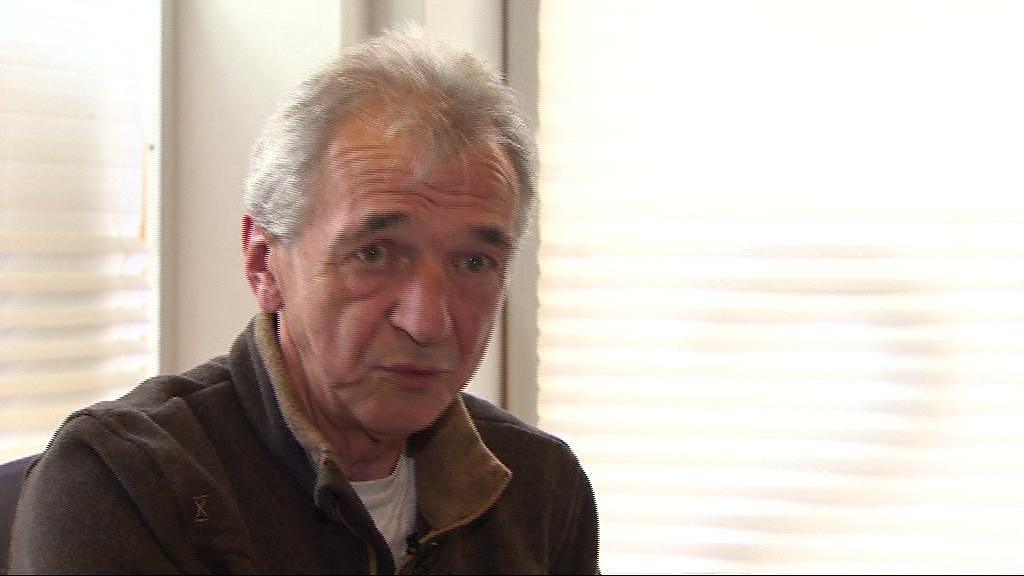Drug deaths in Scotland rose by 23% in 2016
- Published
Father-of-two Graham Biggley died of a drugs overdose earlier this year
The number of drug-related deaths in Scotland last year totalled 867, a rise of 23% on 2015.
Numbers have been steadily increasing since 1995, when 426 fatal overdoses were recorded.
The latest statistics from the National Records of Scotland, external showed more than 70% of deaths were among people aged 35 or over.
Critics say the continuing rise calls into question the effectiveness of the Scottish government's drugs strategy.
However, the minister for public health, Aileen Campbell, said "unfortunately" the figures for Scotland were representative of a general trend of increasing drug deaths "across the UK and in many other parts of Europe".
'No easy solutions'
She added that the problem in Scotland was complex and based on a legacy of drugs misuse "stretching back decades".
Ms Campbell explained: "What we are seeing is an ageing group of people who are long term drugs users.
"They have a pattern of addiction which is very difficult to break, and they have developed other chronic medical conditions as a result of this prolonged drugs use."
She said she recognised more needed to be done but that there were "no easy solutions".
The Scottish Conservatives urged ministers to embark on a new strategy in light of the "appalling" figures and the Scottish Greens said there was "little sense" in funding cuts to initiatives combating drug and alcohol problems.
A breakdown of the figures showed that;
men accounted for 68% deaths
38% of the total were people aged between 35 and 44
30% of the fatalities were in the Greater Glasgow and Clyde health board area
the next biggest area was Lothian at 15%
88% of the deaths were related to the taking of opiates or opioids
55% involved heroin and/or morphine
49% were linked to benzodiazepines, for example diazepam and etizolam
Dave Liddell, chief executive of the Scottish Drugs Forum, said the scale of the problem was a "national tragedy that requires a fundamental rethink of our approach".
He said: "Other countries have achieved a reduction in overdose deaths by ensuring that people are appropriately retained in high-quality treatment and we must aspire to do the same."
Is being drug-free the only solution?
Danny Campbell believes the Road to Recovery drugs programme has been distorted to become "just about abstinence"
In 2008, the Scottish government introduced its Road to Recovery strategy, external focused on tackling the country's drug problems "through prevention, treatment and rehabilitation, education and enforcement".
Danny Campbell, who is project manager at North Edinburgh Drug Advice Centre, believed the strategy had been "distorted" to become "just about abstinence".
He insisted that becoming drug free was not the right solution for all addicts.
Mr Campbell told BBC Scotland's social affairs correspondent: "The Road to Recovery was about whole journey from chaos to an element that may not include abstinence.
"It may be that some of those clients are going to have medication of some kind to help them cope with life, whether it be physical health or mental health conditions, anxiety, depression and therefore total abstinence is never going to be a realistic place for them to be in."
The latest rise in the number of drugs deaths has prompted campaigner Julie Biggley to highlight that behind every statistic is a human being with a story.
Her nephew Graham Biggley died earlier this year from a drugs overdose. He was the fourth member of her family to die from addiction - she has also lost a cousin and two nieces in recent years.
Ms Biggley helps run Kilmarnock-based Someone Else's Addiction (SEA) which supports families of drug abusers.
Of those who die from overdoses, she said: "These are people, these are people's family - daughters, sons, they are not just statistics. I believe that those best to support are the families, but the families can't cope, they can't cope themselves."
Most figures are from 2015, some are from 2014 or earlier. For all countries apart from Scotland, the figures are taken from Table A6 of the EMCDDA's European Drug Report 2017, external, which is available from the European Monitoring Centre for Drugs and Drug Addiction website.

What opposition parties are saying
Scottish Conservative health spokesman Miles Briggs said the figures were nothing short of "appalling". He went on to urge the government to embark on a new drugs strategy. Mr Briggs said: "People will be stunned that the death rate here is more than twice that of the rest of the UK, and that poses some extremely tough questions for the Scottish Government. For decades now we've had a drugs policy that simply parks people on methadone programmes, offering them zero hope of ever beating addiction completely."
Scottish Green health spokeswoman, Alison Johnstone, said that given the rise in drug deaths it made "little sense" as to why the Scottish government had cut funding for drug and alcohol initiatives. She added: We need a serious rethink of how we support people with addictions. Often, they are being asked to jump through hoops, where rather than making a single phone call to register for support, they are instructed to make phone calls and attend appointments at specific times - no easy thing to do if you're struggling with addiction and a chaotic lifestyle and little support. Regardless of location, equal access to a range of treatment is key."
Scottish Labour's Monica Lennon also criticised cuts to funding for alcohol and drug partnerships. She said: "SNP ministers need to give themselves a shake and take responsibility for their actions. If you under-fund vital substance misuse services, people die. I urge the SNP Government to have the courage to take a different course."
- Published15 August 2017
